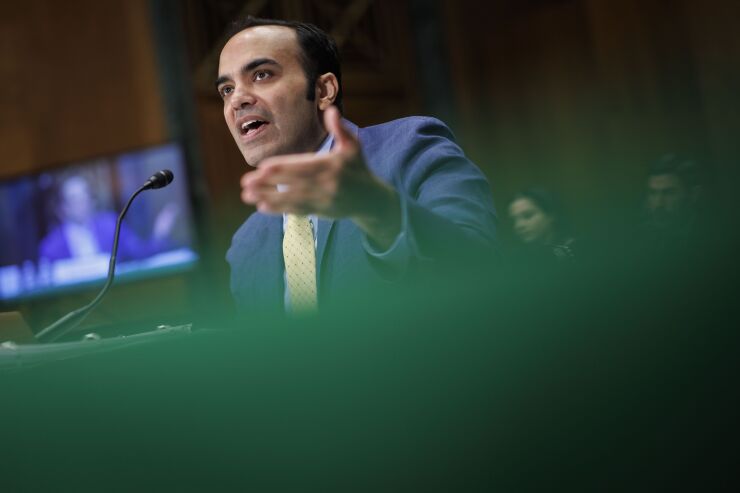
WASHINGTON — Consumer Financial Protection Bureau Director Rohit Chopra said banks' mergers should go beyond meeting regulatory requirements by also proving that they're filling unmet needs in the communities they serve.
Chopra touted recent efforts by federal regulators to enhance scrutiny of bank mergers in a speech at the National Community Reinvestment Coalition's conference Wednesday. He added that regulators had lost focus on the best ways to evaluate whether a bank combination would better the lives of community members.
The Federal Deposit Insurance Corp.
"We see so many individual towns, cities, communities, have dealt with the harms inflicted by the creep of consolidation across the banking sector," Chopra said to the audience of nonprofit leaders, consumer group advocates and bankers. "[The policy revisions] are intended to address all of this and restore a reconnection to service to the community and the public."
As Chopra lambasted current "rubber stamp" regulation,
Critics of the deal, including the NCRC, fear it would limit options for subprime borrowers and decrease competition. The bank claims the merger would create more competition by bolstering Discover's network against powerhouses Visa and Mastercard.
Although the FDIC doesn't have pull in the blockbuster transaction, which needs approval from the Federal Reserve and Hsu's OCC, Chopra made clear in his Wednesday remarks that he doesn't jive with the prospect of the deal crossing the finish line. Whether the banks' plan will satisfy regulatory hurdles
Banking regulators and the Department of Justice must decide whether the blockbuster deal raises antitrust concerns. Looming over their analyses are questions about how broadly or narrowly to define the relevant markets.
Federal Reserve Vice Chair for Supervision Michael Barr,
While highlighting provisions of the FDIC's proposed changes, Chopra said that bank combinations should boost competition, but the review of community impact is a distinct, equally important evaluation.
"The community should be better served by the combined institution, not just shown that it won't be worse," Chopra said. "We have to have answers to the questions: Does the merger address the gap or unmet need in the community? Will the merger improve the product services and delivery channels the community already has or doesn't have now? In other words, is there any benefit at all?"
Chopra added that community groups have often taken the onus of negotiating community benefit plans with merging banks, but don't have means of enforcing compliance. The FDIC proposal increases accountability for the regulators, Chopra said, by establishing community commitments as formal conditions of a merger's approval.
For example, the NCRC and KeyBank's parent company, KeyCorp, collaborated on a community benefit plan in 2016 that helped smooth the way for the Cleveland bank's acquisition of First Niagara Financial Group, only for the relationship to sour a few years later. However, on Wednesday, NCRC President and CEO Jesse Van Tol






